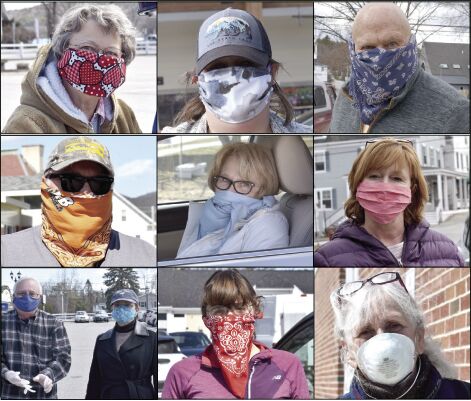LACONIA — The Laconia Daily Sun carried its first local story about COVID-19 on Feb. 6.
Preparations were being made at Lakes Region General Hospital for a new virus that had proved deadly in China, but the chances for contracting it in New Hampshire seemed remote. Nobody had yet tested positive for the disease in the state.
“Currently I suspect the average Lakes Region citizen is at higher risk from the influenza or measles viruses,” Dr. Fred N. Jones, chief medical officer of LRGHealthcare, said in an email on Feb. 3.
Nearly 11 months later, there have been 42,697 cases statewide, 1,879 in Belknap County, and 735 deaths, 44 in the county, according to the state Department of Health and Human Services. Nationally, there have been 334,029 deaths, according to the U.S. Centers for Disease Control and Prevention.
The pandemic and its effects on residents, businesses, schools and daily life was the biggest story of a year in which a general election was held, the Colonial Theatre renovation began, Lakeport got a facelift and Concord Hospital’s acquisition of LRGHealthcare got underway.
Top stories
Controversy erupted over the lengthy suspension of the No. 2 man at the sheriff’s department.
The City Council approved a $1.14 million purchase from the Catholic Diocese without initially informing taxpayers.
Voters elected an all-Republican county Legislative Delegation, one of whom quickly drew a firestorm of criticism by linking on social media to anti-Semitic material from a neo-Nazi website.
Even the home of Mayor Andrew Hosmer became a story. He resided in newly purchased digs on swanky Governors Island in Gilford, despite a requirement that the mayor live within city limits. He explained the situation was temporary and that he would be moving in to a smaller home near downtown Laconia, while his family remained on the island.
The icing on the cake for 2020 in the Lakes Region was a mid-December storm that dumped a record-shattering 3 feet of snow in some places.
Year of COVID-19
But through it all, COVID-19 dominated the headlines.
On March 12, Gov. Chris Sununu declared a state of emergency, giving the state greater flexibility in responding to the pandemic, but stressed “this is a low-risk situation.
“Food supplies are not running out. Supply chains will be there. This is a time for calm."
Soon there were shortages of toilet paper, hand sanitizer, bread, flour, sugar and other staples.
By March 23, the state had 100 cases and the governor said it ultimately could have thousands more. He issued emergency orders prohibiting most scheduled gatherings of 10 people or more, putting schools on remote instruction, prohibiting dine-in service at restaurants, blocking eviction proceedings, expanding unemployment compensation eligibility, closing non-essential businesses and restricting hotel operations. Orders followed to renew or modify those restrictions.
In all, he has issued 78 emergency orders this year.
Businesses, schools, hospitals
Many businesses struggled. Restaurants, barber shops and small retail establishments all were hurt by restrictions or alterations in customer habits, even as government assistance programs provided loans and grants.
Ski resorts closed amid good spring conditions, putting an end to what had been a strong season.
Students and parents struggled as schools went to remote learning. Some of those struggles returned in the fall, when schools offered in-person instruction but had to go back to remote at times because of positive COVID-19 tests, quarantine requirements and staffing issues.
LRGHealthcare, already struggling from years of financial problems under a large debt load, furloughed 600 people in early April while closing elective services and preparing for an expected surge in coronavirus cases.
By the end of the year, the health care system was in Chapter 11 bankruptcy. Concord Hospital won court approval to purchase its assets, including Lakes Region General Hospital and Franklin Regional Hospital, for $30 million. State regulators still must consider the plan in the new year.
Meanwhile, some businesses, such as grocery and hardware stores, thrived. The boating industry reported strong sales as people looked for ways to get outdoors in a socially distanced way. Liquor stores reported plenty of demand for alcohol.
Colonial renovation
A positive development in a year with many challenges was the start of long-delayed renovation work on the Colonial Theatre. Viewed as a possible catalyst for a downtown renaissance, the project got underway in January.
An army of construction workers, carpenters, electricians, plumbers and artisans worked to once again make the historic theater the city’s showcase.
In another downtown development, the City Council decided to purchase the St. Joseph Church rectory and Catholic school for $1.14 million in order to create 84 new parking spots while saving the historic church from the wrecking ball.
The decision was made outside the public eye. Bonds for the acquisition were listed in the budget only as “XYZ,” without further explanation, and City Manager Scott Myers asked councilors not to discuss it in open session.
Hosmer and Myers said the maneuver was legal, even as government transparency advocates said it’s best to be up front and let the public know how its money is being spent, sooner rather than later.
“The city wanted to make sure it could get the best deal possible,” Hosmer said at the time. “Others may have gotten into negotiations and driven the price up.”
Lakeport renaissance
As the year drew to a close, plans were being made to demolish older storefronts on Elm Street near Union Avenue. They are to be replaced by retail stores on the ground floor and condos upstairs.
This is part of Scott Everett's master plan to breathe new life and vibrancy into the city's Lakeport neighborhood.
Last year, the businessman renovated the historic Opera House at Union Avenue and Elm Street, which became the new home of The Laconia Daily Sun and a second Wayfarer Coffee Roaster's location.
The second floor of the coffee shop opens into the building’s pièce de résistance, the Opera House stage, with its embossed tin ceiling, decoration along the front of the balcony and suspended glass globe light fixtures.
Everett plans to revitalize the space and open it for the performing arts, including school productions. There is also a third floor, which will be used for residential spaces.
New mayor
Hosmer was sworn in as mayor on Jan. 9, succeeding Ed Engler, who had served three terms and was the moving force in getting the Colonial project off the ground.
The new mayor praised his predecessor for economic development initiatives and for his constructive tone.
“Let’s be bold,” Hosmer said at his swearing-in ceremony. “Our city really can be as great as we want it to be. We need to see the potential and believe in the city’s potential and be willing to work together to realize that potential.”
Hosmer discussed his residency in a Nov. 23 City Council meeting.
Some people were demanding that he resign because he had recently begun spending his nights in Gilford.
Hosmer said he was selling one home in Laconia and preparing to move into another residence in the city. In the meantime, he was living in a newly purchased home on Governors Island, in Gilford, just over the city line.
“My domicile is not forfeited because of a temporary absence if one intends to return,” he said citing a state statute. “Though I may have spent at various times in Gilford at the newer house it has never been my intention to change my residence … or domicile. … As long as I have the privilege of being mayor I will remain a resident of this city.”
Election Day
In the Nov. 3 general election, Belknap County took a decidedly Republican turn.
Local voters rejected the only two Democratic representatives in the county legislative delegation while a majority in the region supported GOP candidates for president, governor and U.S. Senate.
Statewide, Republicans flipped both chambers of the state Legislature from Democratic to Republican control.
In the county, voters rejected Democratic Rep. Charlie St. Clair, executive director of Laconia Motorcycle Week, who was running for a third term.
He said the presidential election energized voters and many cast their ballots strictly on the basis of the party of the candidate.
St. Clair also said there was a lot of misinformation on the campaign trail, including the contention that a Democrat-backed family leave bill amounted to a new tax.
Rep. Mike Sylvia, the county delegation chairman, said voters understood which party was more frugal with their money.
Whether or not it is called a tax, money would have been needed to fund the family leave bill, he said.
“One of the things I noticed was Democrats had a full page ad of all the things they were going to do for and give to the citizens, with no mention of how they were going to pay for it,” Sylvia said. “People of the county know better.”
Dawn Johnson
One of the newly elected representatives, Dawn Johnson, also a Laconia School Board member, drew outrage for posting a link on social media to an election conspiracy article that included an anti-Semitic cartoon.
It came from The Daily Stormer, an anti-Semitic, neo-Nazi, racist and misogynistic website. She removed the post and said she didn’t realize the source, but never explicitly apologized for the material itself.
Nearly 300 people participated in a school board Zoom meeting and many asked for her resignation. The board stripped her of committee assignments.
Johnson seemed miffed at her colleagues.
“You guys are supposed to be my friends,” she said.” You are a disgrace. I am not resigning. The more you push on me the harder I’m going to fight.”
Earlier in the meeting she stressed that she had made her apology.
“It was a mistake. I will not be resigning. I will stay on. The apology was issued. If you have any more comments you can speak to my lawyer."
New sheriff in town
On Jan. 6, a new sheriff will be sworn in.
Voters elected Belknap County Sheriff’s Sgt. William Wright to succeed retiring Sheriff Mike Moyer.
One facet of the campaign was a controversy surrounding the sheriff’s department over the June retirement of Sgt. David Perkins, who had also considered running for sheriff.
Before Perkins retired, he was suspended with pay for six months and was the subject of three personnel investigations, all without any public explanation. The investigations came after Perkins raised questions about the integrity of the Sheriff's Department's Drug Task Force, which is led by Wright. Perkins’ lawyer filed suit against the sheriff's office and county, saying his client was the target of harassment and retaliation by the Sheriff's Department.
Belknap County Commissioner Hunter Taylor demanded a public explanation for the investigation, but none was forthcoming.
Frosting on cake
Finally, as the year wound to a close, a snowstorm for the ages buried the Lakes Region.
The Dec. 17 storm dumped more snow in the region than any since one in 1888, the National Weather Service said.
Spotters said 42 inches accumulated in Sanbornton, 39 inches in Gilford, 39 inches in Meredith and 30 inches in Laconia.
Skiers welcomed the snow, but it mostly ended up melting a week later amid rain and unseasonably warm temperatures.



















(0) comments
Welcome to the discussion.
Log In
Keep it Clean. Please avoid obscene, vulgar, lewd, racist or sexually-oriented language.
PLEASE TURN OFF YOUR CAPS LOCK.
Don't Threaten. Threats of harming another person will not be tolerated.
Be Truthful. Don't knowingly lie about anyone or anything.
Be Nice. No racism, sexism or any sort of -ism that is degrading to another person.
Be Proactive. Use the 'Report' link on each comment to let us know of abusive posts.
Share with Us. We'd love to hear eyewitness accounts, the history behind an article.